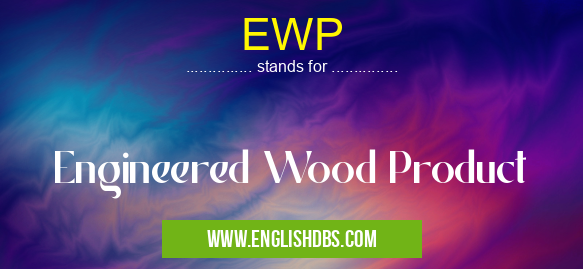What does EWP mean in PRODUCTS
Engineered Wood Products (EWPs) are manufactured wood products that combine layers of solid wood, wood fibers, or veneers to create a composite material with enhanced strength, stability, and resistance to warping and shrinkage.

EWP meaning in Products in Business
EWP mostly used in an acronym Products in Category Business that means Engineered Wood Product
Shorthand: EWP,
Full Form: Engineered Wood Product
For more information of "Engineered Wood Product", see the section below.
- EWP stands for Engineered Wood Product, an innovative material widely used in the construction industry. Engineered wood products are manufactured by combining wood fibers, resins, and adhesives to create durable and versatile building materials.
Types of EWP
- Plywood: Consists of thin layers of wood veneer glued together with the grain running in alternating directions.
- Oriented Strand Board (OSB): Made from wood strands oriented in specific directions and bonded with resins.
- Laminated Veneer Lumber (LVL): Thin wood veneers glued together to form beams or panels.
- Glulam (Glued Laminated Timber): Layers of dimensioned lumber glued together to form structural beams or columns.
Benefits of EWP
- Strength and Durability: Engineered wood products are stronger and more durable than traditional lumber due to their precise manufacturing process.
- Stability: The alternating grain orientations and layering techniques minimize warping and shrinkage, resulting in stable and dimensionally accurate materials.
- Fire Resistance: Some EWP products are treated with fire retardants, making them suitable for use in fire-rated constructions.
- Versatility: EWP can be used in various applications, including sheathing, flooring, roofing, and structural components.
Applications of EWP
- Construction: Wall framing, roof decking, subflooring, joists, beams.
- Manufacturing: Furniture, cabinets, doors, windows.
- Industrial: Pallets, crates, packaging.
Essential Questions and Answers on Engineered Wood Product in "BUSINESS»PRODUCTS"
What is an Engineered Wood Product (EWP)?
What are the different types of EWPs?
Common types of EWPs include:
- Plywood: Layers of thin wood veneers glued together with alternating grain directions for increased strength.
- Oriented Strand Board (OSB): Layers of wood strands oriented in a specific direction for enhanced durability.
- Laminated Veneer Lumber (LVL): Layers of wood veneers glued together to create a strong and stable product.
- Glued Laminated Timber (Glulam): Layers of solid lumber glued together to form large beams or columns.
What are the advantages of using EWPs?
EWPs offer several advantages:
- Strength and Durability: Engineered wood products are typically stronger and more durable than solid wood, making them suitable for demanding applications.
- Dimensional Stability: EWPs are less prone to warping and shrinkage due to their layered construction.
- Resistance to Pests and Decay: The use of adhesives and preservatives in EWPs enhances their resistance to pests and decay.
- Cost-Effectiveness: EWPs are often more cost-effective than solid wood due to the use of smaller pieces of wood and efficient manufacturing processes.
Where are EWPs commonly used?
EWPs find application in various construction and industry sectors, including:
- Building Construction: Framing, sheathing, subflooring, and roofing.
- Flooring: Laminate flooring, engineered hardwood flooring, and vinyl flooring.
- Industrial Applications: Furniture, cabinetry, and pallets.
- Automotive Industry: Upholstery frames and dashboard components.
Final Words: Engineered Wood Products (EWP) are a valuable innovation in the building industry, providing strength, stability, and versatility. Their diverse applications make them suitable for a wide range of construction and manufacturing projects. Understanding the meaning and benefits of EWP empowers architects, engineers, and builders to make informed decisions when selecting materials for their projects.
EWP also stands for: |
|
| All stands for EWP |
